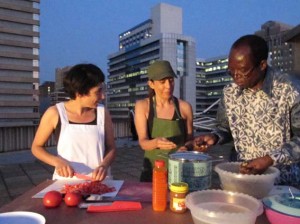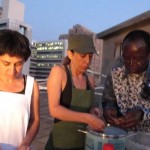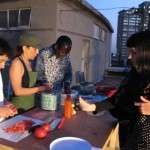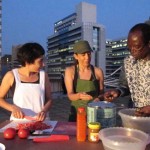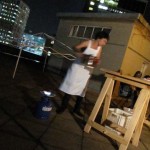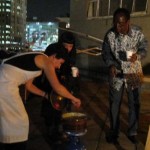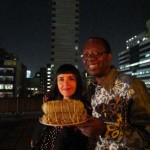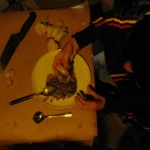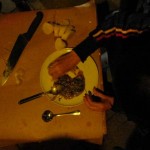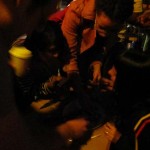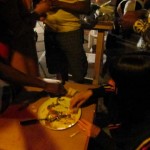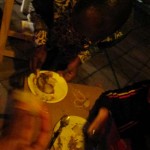Jhb / Last day / MFUMBWA / Sept 2011
Auteurs / Authors : Dominique Malaquais, Daniel Shongo, Natasha Christopher
Participants : Dominique Malaquais, Daniel Shongo, Natasha Christopher with the complicity Eleonore Hellio
Lieu / Place : Rockey Street, Yeoville, and Toit de la Wits School of Arts, Joburg
date(s) : septembre 2011
Durée (processus jusqu’à présentation ou à préciser / Duration (process until presentation or to be specified) : Two days
Description (medium, genre, concept, questions, critics…) : Performance / Food / Translation / Ownership (language, recipe).
It’s Play Urban 4 (Strasbourg, 2013). We (Natasha and Dominique) are having lunch in a Lebanese restaurant. Over falafel and baklava, we talk about our performance at Play Urban 2 (Joburg, 2011). We made mfumbwa for forty people. Mfumbwa is a Congolese dish of spinach-like greens, tomato, palm oil, peanuts and salted fish. It is served with chikwang, fermented cassava (manioc) flour. We decided to make mfumbwa after sampling a whole range of foods on Rockey Street and ending up, eventually, at Restaurant Kin Malebo. We had several sources for the recipe. We asked the owners of the restaurant; Daniel, however, disagreed with their instructions. So we inquired from a vegetable vendor at the local market. There too, there were doubts, so we went online. The web recipe was in French, Dominique translated it into English and Daniel into Lingala. Shopping and preparations took most of a day and the cooking and serving – the performance proper – lasted about two hours.
Perspectives :
Both of us (Natasha and Dominique) have misgivings about cooking: food preparation is an ambiguous space for us. The reasons are different, but to put it succinctly, it is a set of practices that comes (a little too) close to memories of growing up. Food stands for both of us at the heart of complicated affective and monetary economies. It is precisely because of these misgivings that we embarked on the project: to test the extent of their presence in our daily lives as adults. The results were mixed. We found the experience daunting, yet, at the same time, and to our surprise, we took pleasure in it.
And where was Daniel in all of this? Giving instructions. The dynamic was fascinating. A man who, by his own admission, had never cooked mfumbwa (or much of anything else) was determined to direct the process and we, staking a claim to knowledge on grounds of gender (a peculiar position for the two of us, but our position nonetheless) were just as determined to take ownership of the process. Things became tense as a power struggle developed over authorship of the dish.
Then came Eléonore, promptly appointing herself taster-en-chef. We were delighted when she gave our food a passing mark.
At the heart of it all was the matter of authority. Who had the specialist’s knowledge to identify what was and was not right? Who had the right to claim knowledge? And who to contest it? Gender. Age. Authority. Authenticity. Language. Race. In the end, food was the least of our problems.
Axes de recherche / Research axes (Play/Urban) :
Protocoles (collectif) d’action / (collective) action protocols :
A project by Natasha Christopher, Eléonore Hellio, Daniel Shongo, Dominique Malaquais.

